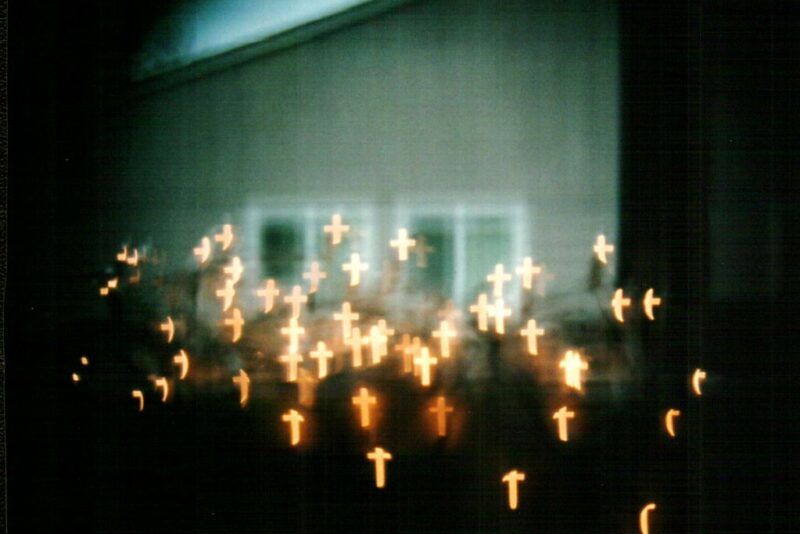We called in to see him between running errands. My mother led the way—through town and up a side street, my sister striding along beside her, me trailing along behind, befuddled by jet lag. The receptionist was cheerful. She told us he was ready, and to leave our shopping in the waiting room.
We let ourselves in. The room was windowless and cool, the light so muted that it turned everything muddy. On the wall, a large wooden cross hung from a hook—so it could be replaced, or taken down—and there, below it, my father lay in his coffin. I didn’t need to come close to see that his face had sunken in, the nose beaky, the mouth strangely tight and thin. The shock of it pinned me in place.
My mother, though, was bending over him. She touched his chin, pulled at his lips, muttered something about how they stitched them together, didn’t they? When she called us over my sister gave in, and the two of them tilted this way and that for a better view into the covered half of the coffin because, they wondered, where were his hands? Why couldn’t we see them? And the whole time my mother fussed, touching his shirt, his hair, and if he’d been alive he’d have ducked away in annoyance. At last she turned: I should come now and see him, it was why we were here. Did I speak? I know I shook my head and looked down at the carpet, anywhere but at my father.
I remember how it was to walk out of that room, to be swamped by fluorescent light and the gentle chat of the receptionist, to pick up our bags of groceries and head into the grey February afternoon—it was a return to life, nothing less. My mother was all business, stopping to buy eggs at the place that she now always bought eggs, driving us home for a late lunch, setting pasties out on our plates, and me—what a horror I became, spitting at her not to touch our food, that she must wash her hands first, what was she thinking after what she’d touched? And the look she gave me, eyes pinched with disgust.
That night I woke again and again: dreams of pursuit, dreams of terror. Behind it all, my mother’s snores churned through the darkness.
Gerri Brightwell is a British writer who lives in Alaska with her husband, fantasy writer Ian C. Esslemont, and their three sons. She is the author of the novels Dead of Winter (Salt, 2016), The Dark Lantern (Crown, 2008), and Cold Country (Duckworth, 2003). Her short work has appeared in many venues including The Best American Mystery Stories 2017, Alaska Quarterly Review, Southwest Review, Copper Nickel, Redivider, and BBC Radio 4’s Opening Lines. She teaches in the creative writing program at the University of Alaska, Fairbanks.

